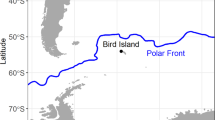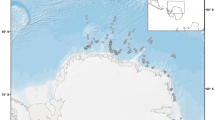Abstract
APART from stragglers from the Antarctic and subantarctic regions, the only pinnipeds normally found on the Australian coasts are hair seals or sealions (Neophoca) and fur seals (Arctocephalus). There is no doubt about the identity of the single species of sealion (N. cinerea), but there has been no settled opinion about the number of species of Arctocephalus.
This is a preview of subscription content, access via your institution
Access options
Subscribe to this journal
Receive 51 print issues and online access
$199.00 per year
only $3.90 per issue
Buy this article
- Purchase on Springer Link
- Instant access to full article PDF
Prices may be subject to local taxes which are calculated during checkout
Similar content being viewed by others
References
Jones, F. W., Rec. S. Austral. Mus., 3, 9 (1925).
Scott, H. H., and Lord, C., Pap. Proc. R. Soc. Tasmania, 1925, 75, 187 (1926).
Lesson, R.-P., Dict. Class. d'Hist. Nat., 13, 421 (1828).
Jones, F. W., The Mammals of South Australia, part 3 (Adelaide, 1925).
Le Souef, A. S., Austr. Zool., 4(2), 112 (1925).
Author information
Authors and Affiliations
Rights and permissions
About this article
Cite this article
KING, J. On the Identity of the Fur Seals of Australia. Nature 219, 632–633 (1968). https://doi.org/10.1038/219632b0
Received:
Issue Date:
DOI: https://doi.org/10.1038/219632b0
Comments
By submitting a comment you agree to abide by our Terms and Community Guidelines. If you find something abusive or that does not comply with our terms or guidelines please flag it as inappropriate.



